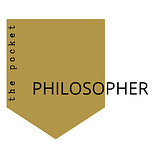“Between stimulus and response there is a space. In that space is our power to choose our response. In our response lies our growth and our freedom.”
— Viktor E. Frankl
Philosophers,
This morning is all about this space.
The moment just before we are filled with the righteous anger of our evolutionary ancestors. Just before we shrink away in anxiety, or spiral down in isolation and resentment.
Of course, there are many reasons for feelings of isolation, sadness, depression, anger, and resentment. I’ve found these are experiences best explored through a relationship with a trusted mental health professional. I’m partial to the perspective that healthy people are in therapy. It’s amazing what time in that space can do for you.
But today, and all this week, we’ve been interested in a certain type of response. The responses we feel to a broken plate, being late, getting cut off in traffic, losing our keys, trying to get our loved to one to just see it our way etc.
The crisis of the everyday, we’ve called it.
And in that space between stimulus and response, we often chose the habitual, addictive thought and behavior pattern. Unconscious tapes that play on autopilot, often without our consent or awareness.
“Who is this person?” we might think after slipping into an anxious loop or over-reacting with a loud voice.
Yesterday I promised to share Pema Shodron’s first tool in this battle for conscious awareness.
Her secret weapon: curiosity.
And, I believe (based on her teaching you can find here) that her premise isn’t simply that being curios will prevent you from experiencing outsized emotions. But rather, that the right type of curiosity brings us into the seat of an observer, capable of understanding what we really want, and where we can witness how our anger or anxiety is not actually getting us there.
The voice of curiosity might ask,
What am I hoping to get out of this emotional reaction?
What did I think the outcome would be?
Do I feel justified in this reaction? Why or why not?
Is it working, did I achieve the outcome I want?
These overwhelming experiences of anxiety and anger often come from a sense of vulnerability, fear, and uncertainty a stimulus triggers within us. Therefore, we immediately seek the familiarity of a behavior pattern, believing in our reptile brain that it will give us what we need.
Often, however, it merely prolongs the amount of time we must face the consequences of the situation.
But sometimes, as we become curious, we begin to notice our responses and challenge their effectiveness.
Slowly, we begin moving from our survival, reptile thinking into our well-developed pre-frontal cortex and are capable of tremendous self-awareness and choice. We begin to respond to stimulus with:
Is this how I want to respond this time?
Will this bring about the the outcome I desire?
In fact, what is the outcome I desire? Now and in the future?
How I can respond to align myself with that?
For some folks, this retraining is as simple as 5.
First, they must notice their habitual patterns of reacting. They must be able to track the process and notice the space between stimulus and response.
Once they have mastered this awareness, they then practice counting to 5.
This action forcibly takes them out of their instinctual brain into their reasoning and logic capacities. By intentionally counting, you are activating the place in your brain that you wish to be.
I’ll leave you with an exercise that a public speaking coach from my company has used in training employees on the art of mindfulness as it relates to our unconscious gestures like leg crossing, the folding of the arms, or saying “uhm” and “like” in our presentations.
He challenges us to choose a gesture that we do unconsciously (like one of the above) and simply decide for a day not to do it.
Don’t cross your legs, don’t fold your arms, don’t touch your face etc.
This simple, easy, and harmless practice begins to strengthen this capacity we all have for mindfulness and self-awareness which can allow us to chose how we respond to life rather than folding into habitual, addictive behavior patterns.
But, it all begins with curiosity.
Not, “why am I feeling this way,” but “what is it that I really want from this?”
When we start there, we’re well on the road to self-awareness and gaining mastery over that chasm between Frankl’s stimulus and our response. According to him, it’s at this point that you gain true freedom.
Until tomorrow my friends,
Matt
References:
https://www.goodreads.com/quotes/8144491-between-stimulus-and-response-there-is-a-space-in-that














Share this post